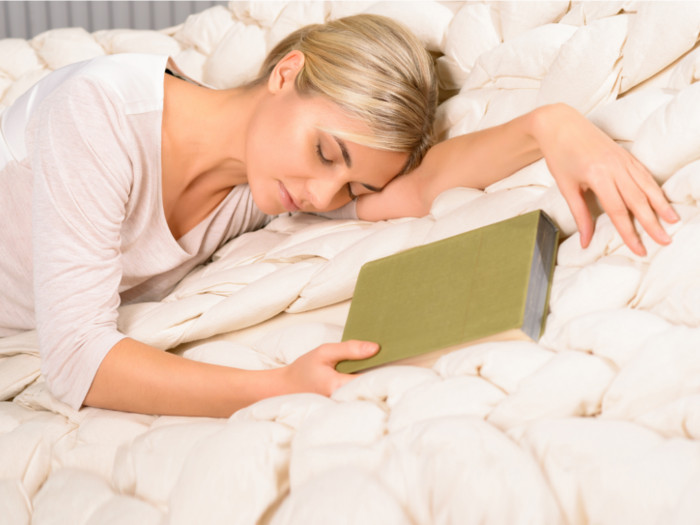Learning how to fall asleep fast is important, particularly for those who typically struggle to get a full night of restful sleep.
What is Sleep?
Sleep is one of the most important aspects of life, as this is the time when our body heals itself. If you don’t get enough sleep, you are at a higher risk of nervous system disorders, coronary heart diseases, diabetes, anxiety, and high blood pressure. For most people, it takes approximately 10-20 minutes to fall asleep, a period known as sleep latency. However, other people may lay awake for hours, depriving themselves of the rest they need. [1]
How to Fall Asleep Fast?
The best ways to fall asleep fast include taking warm showers, using various breathing methods, reading a book, and turning off all your electronics, among others.
Warm Shower
Taking a warm shower before bed can relax your muscles and clear your mind, which is the perfect condition to fall asleep. [2]
Cool Your Room
If you keep your room relatively cool, you will want to snuggle in deeper into your blankets and pillows, helping you get comfortable and slip into slumber.

Wear Socks
Having cold feet can be distracting when you are trying to fall asleep, and the toastier you feel, the more likely you are to fall asleep, so be sure to put on socks before climbing into bed.
‘4-7-8’ Method
The 478 breathing method has been shown to promote good sleep as it increases the oxygen supply to the bloodstream, slowing the heart rate and releasing more carbon dioxide.
Use Lavender Essential Oil
Lavender essential oil helps relax your nerves and lowers the blood pressure. This can help promote good sleep.
Visualize your Happy Place
Visualizing your favorite place before sleeping can make you calm down, reduce anxiety, and thereby help induce good and fast sleep.
Immerse Face in Cold Water
Immersing your face in the cold water for 30 seconds leads to an involuntary phenomenon called the mammalian dive reflex that helps in stabilizing your heart rate and regulating blood pressure. This makes you sleep faster.
Limit Caffeine Intake
Avoid coffee and tea in the second part of the day, as these caffeinated drinks can keep you up past your normal bedtime. [3]
No Electronics
Smartphones and computers, as well as television, can keep the brain stimulated and active, while the bright lights can even trick the brain into thinking it is the middle of the day. [4]
Sleep Position
If you regularly struggle to fall asleep quickly, change your sleep position until you are completely comfortable, and then close your eyes, rather than tossing and turning.
Force Yourself to Stay Awake
Avoid getting into your bed before you are actually tired enough to fall asleep, as your body will connect the physical space of bed with sleeping.
Listen to Music
Soothing music can be a wonderful way to clear your mind of external thoughts and prepare you for slumber. [5]
Hide Your Clock
Staring at your clock will only make you worry more about not sleeping, which can put slumber even further from your grasp. [6]
Progressive Relaxation
If you progressively relax your body, beginning in your toes and ankles, moving up to the knees, hips, and back, by the time you reach your head, you might already be well on the way to sleep. [7]
Exercise Wisely
Don’t exercise too close to bedtime, as it can get your blood pumping and keep you awake, even if it does “tire” you out.
Sleepy-Time Snack
Great foods to eat before bed include herbal, non-caffeinated teas or a glass of warm milk.
Essential Oils
Diffusing soothing essential oils into your home and bedroom can help ease your mind and balance your hormones, preparing you for restful sleep. [8]
Meditation and Mindfulness
If you lie awake for hours before falling asleep, try meditation, as it can help to clear the mind and prevent it from racing with thoughts before you go to sleep. [9]
Avoid Naps
Sleeping during the day can throw off your Circadian rhythms and make it harder to fall asleep at night, so limit or eliminate any napping during the day. [10]
Make a To-Do List
Making a list before bed can make you think of all you need to do the next day, and also help to get it off your mind and down on paper, so you can sleep peacefully.
Yoga
This regular practice is known to stretch out muscles and calm the mind, which is an ideal situation for sleeping. [11]
Dinner by Candlelight
Rather than harsh lighting in your last meal of the day, try using candles, as this can help relax the mind and eyes before bed.
Blow Bubbles
A rather unusual approach is to blow bubbles with your lips in bed; this repetitive and vibrational technique is believed to aid sleep.
Acupressure
You can teach yourself basic acupressure techniques and apply them while you lie in bed to help relax. [12]
